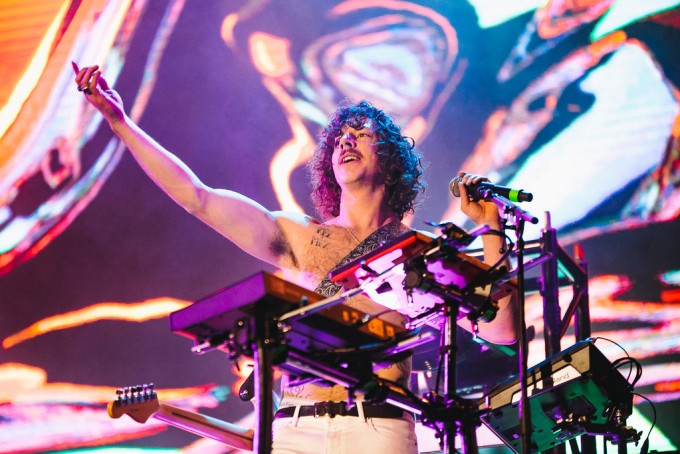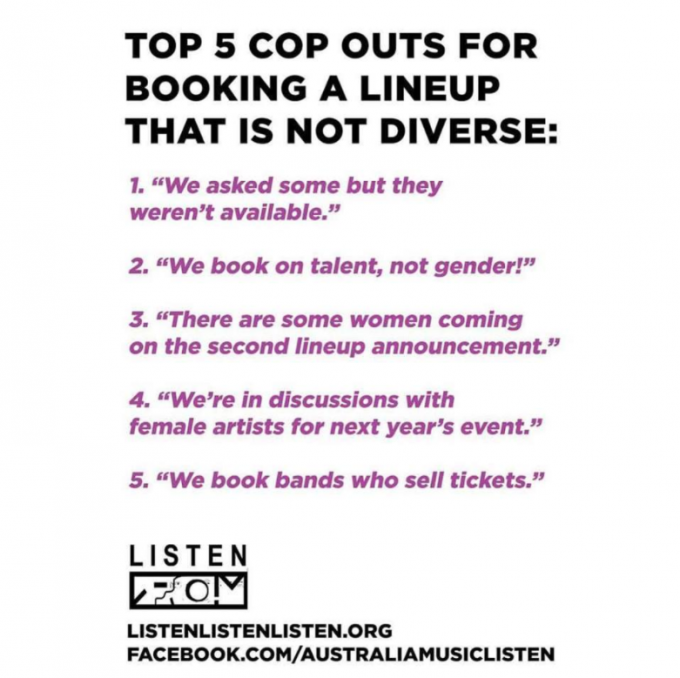When It Comes To Diversity, Australian Festivals Are All Talk And No Action
Festivals have changed how they respond to criticism of their line-ups. What hasn't changed is the line-ups themselves.

Earlier this week, touring company Secret Sounds issued a public statement about diversity on their festival line-ups.
The statement was a response to triple j’s ‘By The Numbers’ report, which looks at the gender breakdown across the Australian music industry. The report — which dropped on International Women’s Day — found that no major Australian festivals had cracked 50 percent female and non-binary representation on their line-ups (Laneway was the highest, with 44 percent of acts featuring at least one woman).
Splendour in the Grass and Falls Festival — both run by Secret Sounds — came in joint last place, with only 31 percent.
In their statement, Secret Sounds pointed out that triple j had made a miscalculation in their original reporting, and claimed that even though the station had since issued a correction, it didn’t “go far enough.”
“We love triple j and have worked with them for many years but like all good friends you have to call them out when you think their rationale is flawed,” the statement read.
“The initial statistics in their story were miscalculated and whilst they have since issued a correction (thanks j’s) we feel it doesn’t go far enough.”
Secret Sounds then criticised triple j’s methodology and argued that guest vocalists — such as AlunaGeorge coming on stage with Peking Duk at Splendour to perform one song — should also be counted as a female artist.
They finished by admitting they “have more work to do and are far from perfect.”
Gee, All Of This Feels Pretty Damn Familiar
Two weeks before Secret Sounds sent off this missive, hip-hop festival Jumanji was slammed for failing to include a single female artist on their 2018 line-up. Their response to the inevitable backlash was that they tried to book female acts, but they were all “either unavailable or not within our budget.”
And only a couple of months before THAT happened, Falls Festival was under fire from a number of high-profile artists after Melbourne band Camp Cope called them out on stage for only booking nine female acts on their 2017/18 line-up.
Their subsequent statement went along much the same lines as Jumanji’s, with Falls co-producer Jessica Ducrou writing that while the festival has “a very conscious and strong agenda to book female talent, it isn’t always available to us at that headline level.” She then advised those who were unhappy to go and start their own event. “We have seen other bands who are passionate about this topic go out and started their own events where they have total control of the line-up.”
“Taking control yourself, is a great way to effect change.”

Peking Duk on stage at Splendour in the Grass 2017. Photo courtesy of Splendour in the Grass.
It’s not like this phenomenon is new. Back in 2015, Listen Out was slammed for only featuring one female act on their line-up. In the same year, Sydney’s Vivid only booked three acts that featured women, compared to more than 50 all-male acts. Both festivals were roundly condemned and were forced to apologise — promising to improve in following years.
In 2016 it was Spilt Milk’s turn to be blasted, after they revealed only one female act on their initial bill — sandwiched between 15 male acts. And just last year, dance festival Days Like This failed to book a single female act for their debut event in Sydney — a fact which drew groans from musicians and dance fans alike.
Almost needless to say, those festivals subsequently apologised and assured punters they would do better. And so it goes.
We’re Stuck In A Hamster Wheel Of Promises
This pattern — of failing to book a diverse line-up, then apologising and promising to do better next time — has become the Australian festival industry’s new standard.
Everyone is sick of it, especially the communities who are asking to be represented on those line-ups. Marginalised artists don’t actually enjoy having to argue for their place within their chosen industry. This is not something anyone relishes.
It’s important to note that triple j chose to focus purely on a gender breakdown in their ‘By The Numbers‘ review. Other factors — such as sexuality and race — haven’t been analysed. But in an exhaustive piece for Pilerats last year, writer Hayden Davies revealed that the percentage of artists of colour on Australian festival line-ups was (shocker) significantly worse than that of gender. On average, artists of colour only make up 16 percent of Australian festival line-ups.
Despite the frequent promises of promoters, there hasn’t been any significant jump in the number of women and non-binary artists on line-ups in the last two years. In some cases it’s actually getting worse: both Falls and Splendour dropped a percentage point in terms of female representation on their line-ups over the last two years, from 32 percent in 2016 down to 31 percent in 2017.
Listen Out is the only major festival that has improved significantly, rising from just 9 percent female representation to 37 percent over two years. It’s an achievement that demonstrates it isn’t actually impossible to start booking diverse line-ups — all festivals need to do is actually commit to it.
Which some are doing — just not in Australia. Last month, 45 festivals from around the world pledged to reach gender parity on their line-ups by 2022, in an initiative called ‘Keychange’. The goal is admirable, although it’s worth questioning why it should take four years to achieve.
No such initiative is on the table in Australia — yet. Instead, what we’ve received over the last few years is a slightly varied combination of the following excuses:

Courtesy: listenlistenlisten.org
Is Anyone Actually Getting The Message?
What has changed over the last three years is that festivals and promoters are actively responding to criticism about their line-ups. But what hasn’t changed is the line-ups themselves.
And often, the statements from organisers only further inflame tensions across the industry. A number of musicians and fans criticised Ducrou’s January statement, claiming it essentially took a position of “if you don’t like it, do it yourself.”
Falls Festival: “We have seen other bands who are passionate about this topic go out and started their own events… taking control yourself, is a great way to effect change.”
Translation: We know gender diversity in festivals is a problem but we’re not making it ours! https://t.co/eSQpgEbpGr
— Monique Myintoo (@aumonique_) January 3, 2018
Similarly, Secret Sounds’ statement this week seemed to dismiss the core issue in favour of arguing about methodology and semantics. So they’re receiving the message… but they’re not really getting it.
And with the Splendour 2018 line-up announce just around the corner, some are speculating that the statement was a precursor to a particularly male-heavy bill — a way to head the inevitable criticism off at the pass.
But even worse, it feels like an almighty swipe at those artists and industry figures who consistently stick their necks out in order to argue for change. It feels like a giant step backwards.
Instead of furiously defending their motives, festivals and promoters need to just listen. Because the excuses aren’t working anymore.
—
Jules LeFevre is Staff Writer for Music Junkee and inthemix. She is on Twitter.


